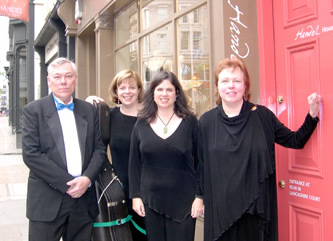Summerfest, the NC Symphony’s summer series, presented in Regency Park’s amphitheatre, in Cary, got underway on the evening of June 3. The elements, the fates, and some astute planning resulted in one of the best concerts yet heard there – in twenty years. For openers, the weather was ideal, the storms that had plagued the region earlier in the day having departed just in time. The Town of Cary has spiffed up the place and at long last dealt with the park’s perennial soggy bottom – the grass just forward of the stage has been paved over with what appear to be mock cobblestones, with more than ample drainage. The sound seemed better than ever, thanks to new, smaller speaker arrays, more sensible microphone placements within the orchestra, and (apparently) more astute sound engineers. This resulted in some of the best sound yet experienced in the venue, with rich-sounding lower strings, solid enough ensemble, decent balance with all sections audible, most of the time, few if any synchronization problems as the amplified sound was spread throughout the park, and a quite remarkably fine dynamic range. And the huge crowd was intensely quiet: one could hear the music nearly all the time, even the softest, most delicate places.
The program was pretty remarkable, too, There’ve been a few complete symphonies on Summerfest programs, but never before (I think) has one of these outdoor programs so closely resembled the tried-and-true concert formula (overture, concerto, symphony) or so generously pushed the envelope beyond the norm for al fresco offerings. The overture was by Copland, the concerto (as it was) was Ravel’s “Tzigane” (1924), the symphony was Beethoven’s Fifth. But that was hardly all there was to it. The Ravel is short, so the distinguished soloist played a sort of planned encore, the Theme from Schindler’s List (1993), by John Williams; it’s movie music, and all that that entails, but it’s much better than average movie music, and it stands well on its own as a moving little concert piece. And there was in addition a second French work – will wonders never cease? – in the form of a rarely heard eight-part Suite from a ballet by Albert Roussel. Now if all that weren’t enough, the entire first half of the program was made up of music composed in the 20th century (although there seemed to be no complaints from any quarter about a surfeit of “modern” fare). Truth to tell, none of it was very modern – Copland’s “An Outdoor Overture” (1938) exudes the sort of broad-themed, expansive music we’ve come to expect from our mainstream US composers, the Ravel is sort of folksy, the Williams is intentionally old-fashioned, and the Roussel could not possibly have offended anyone who enjoys, say, Offenbach’s Orpheus in the Underworld. Still, it was a remarkable program, by any standard.
And the NC Symphony’s Music Director, Grant Llewellyn, conducted, starting out in a Carolina Hurricanes jersey, of all things (prompting one to wonder if any member of the Canes has a Grant bobblehead on the dash of his SUV or a NCS t-shirt…). The jersey was short-lived (till the final bows), but the concert was long on musical values. The Copland, which isn’t heard very often, was warmly projected and as warmly received. Guest soloist Stefani Collins, who won the NCS’ concerto competition in 2004 and has been heard often with the orchestra, played the Ravel (and the Williams, too) with astonishing skill and sensitivity, enjoying solid but never obtrusive support from the orchestra. Llewellyn praised her extensively, as have CVNC critics. It is clear that this young woman is destined to make increasingly important contributions to the art she so splendidly serves.
There are two suites from Roussel’s Baccus et Ariane, Op. 43 (1930); the second one, played in Cary, constitutes the second act of the relatively short ballet, the complete score of which would be welcome at some point on a regular winter-season classical concert program. Llewellyn provided an engaging introduction, there were some wonderful solo bits, and overall the performance gave immense pleasure. It’s also a pleasure to experience this orchestra playing French music again, and so well, too.
After intermission, the conductor bounded onto the stage and the podium and gave a quick downbeat for the Beethoven. It was a bracing reading, quite handsomely played, and it began fast – really fast – as if Llewellyn were a bat trying to escape a really hot place. The rest of the symphony was paced more conventionally. There was a lot of lovely playing from the orchestra, and only once did the ensemble seem to get a bit wiry. Among other things, the performance impressed on the grounds of the virtuosity of the players, who managed to meet their leader at every turn, even in that brisk opening movement. This is all the more remarkable when you remember that these programs typically get only one rehearsal* – and in this case the Roussel was almost certainly not under everyone’s fingers.
Summerfest Artistic Director William Henry Curry leads the next installment in this series on June 10, and all the concerts seem – like this one – unusually sophisticated. The night before, in the same venue, is a freebie, involving the NCS and area musicians in “Play with the Pros,” for which departing Assistant Conductor Carolyn Kuan will do the honors. See our calendar for details.
*Updated 6/9/06: Typically, they do get only one rehearsal – but for this program, there were three, according to several reports….











